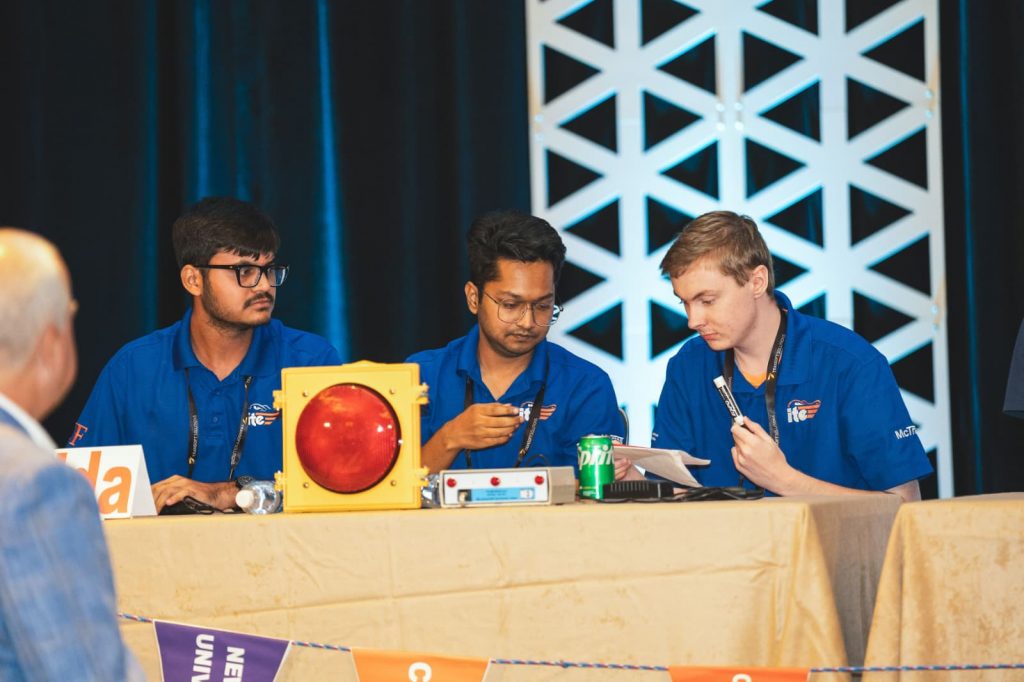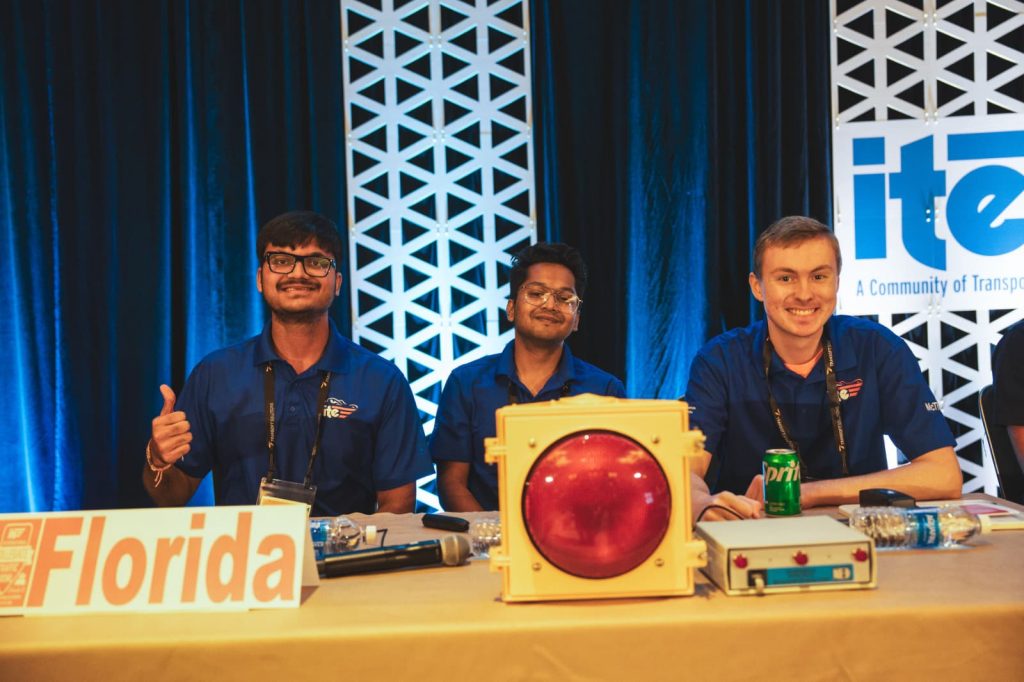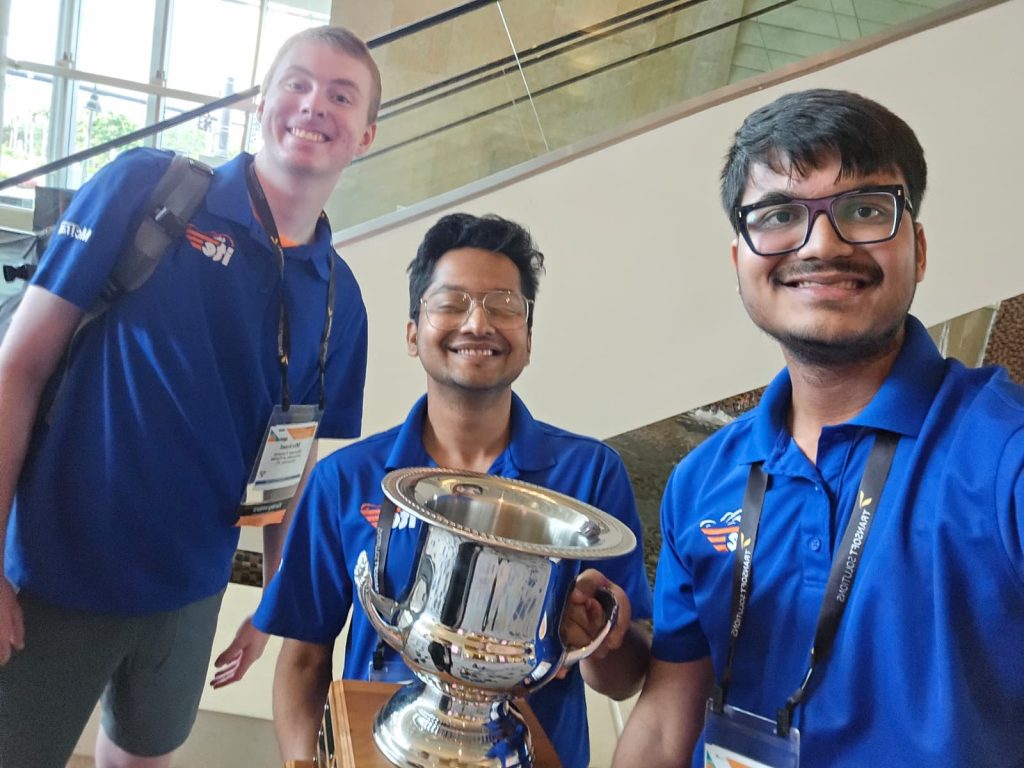By Ines Aviles-Spadoni, M.S., M.A., Research/Communications Coordinator, UFTI

The University of Florida Institute of Transportation Engineers (UFITE) Student Chapter recently claimed its second T-Bowl title in 12 years.
The competition was held on Aug. 11 during the ITE Annual Meeting in Orlando. Modeled after TV’s “Jeopardy,” the ITE International Collegiate Traffic Bowl – known as the T-Bowl – brought together 10 teams from the United States and Canada, including Brigham Young University, New York University, Penn State, Purdue University, Texas A&M, University of British Columbia, University of Kansas, University of Washington and Virginia Tech. UF’s victory brought home the championship trophy and a $1,000 prize.
The competition tests students’ knowledge of transportation and traffic engineering fundamentals, including trivia about the ITE organization and its history. Each team is allowed three students. Representing UF were Michael Paranisi, an undergraduate student in civil engineering, Faizur R. Himel and Sanidhya H. Dadia, both master’s students specializing in transportation engineering.
“We treated the T-Bowl like a marathon, not a sprint,” Dadia said. “We met a couple of times a week for mock practices in the I-STREET lab, reviewing themes such as the MUTCD, HCM, HSM, ITE Traffic Engineering Handbook, AASHTO ‘Green Book’, traffic signs, safety, planning and ITE trivia.”
Preparation for Panarisi went beyond mock sessions. He said his internship with the Florida Department of Transportation (FDOT) Traffic Operations office provided hands-on experience in transportation and traffic engineering fundamentals.

The team familiarized itself with industry manuals and standard practices such as the Manual on Uniform Traffic Control Devices, the Traffic Engineering Manual and concepts such as stopping sight distance, including Canadian references.
“I leaned heavily on the resources I could find, mainly watching past Traffic Bowl videos on ITE’s YouTube channel, which gave me a sense of the format and the kinds of questions that come up,” Himel said. “Our adviser, Fabio Sasahara, also put together a really helpful list of common trivia that past competitors often see.”
Sasahara said this win demonstrated the students’ commitment and hard work amid busy academic schedules.
“Despite our track record of wins in the Florida-Puerto Rico District Traffic Bowl, the International Traffic Bowl competition is exponentially more competitive as it brings the best of the best students across North America. I am sure this is an experience that our students will never forget,” he said.
Team scores were razor close, and it all came down to the Final Clue in the Project Priority category: “The Highway Safety Act of 1973 adopted this ratio methodology for federal funding of safety improvements.”

“We concentrated on mastering the fundamentals, which included our materials, questionnaire database, quizlets and past Traffic Bowl videos,” Dadia said. “And those countless hours of preparation enabled us to confidently tackle the ratio methodology question along with many others. We then answered ‘Cost-Benefit,’ and that bumped us to 3,000 points, while the University of Washington and Brigham Young University answered incorrectly and lost 1,700 points and 901, swinging the match completely to our advantage.”
For Himel, the Traffic Bowl victory was more than a chance to showcase his exceptional transportation engineering skills.
“It gave me the chance to represent UF on an international stage,” he said. “To share that win with my teammates made it even more memorable. Go Gators.”
For Dadia, who had competed and won in this year’s district Traffic Bowl, the international victory proved hours of mock practices were worth it.
“Winning the International Traffic Bowl 2025 with my teammates fills me with pride and gratitude, as well as representing UF, UFTI and Gator ITE alongside our mentors and friends was truly special,” he said. “It also validated that our approach of persistence and learning strong fundamentals from the start beats last-minute cramming.”

Panarisi and Himel said the win was more than just proving UF students academically astute – it was also about winning for Gator Nation.
“The Florida Gators are still a force to be reckoned with, and just because we had a mediocre football season doesn’t mean we aren’t going to be strong at other competitions,” Paranisi said. “While the Traffic Bowl itself isn’t as big as sports and other academic competitions, it is still a feather in our reptilian cap. As my family has repeatedly told me, ‘If you do the little things good, you’ll do the big things great.’”
Dadia said he now feels a sense of duty to mentor the next UFITE Student Chapter Traffic Bowl team.
“Most of all, it gives me a sense of responsibility to pay it forward by onboarding new members, sharing our study materials and encouraging our UF students to jump into the T-Bowl practice early on,” he said.
